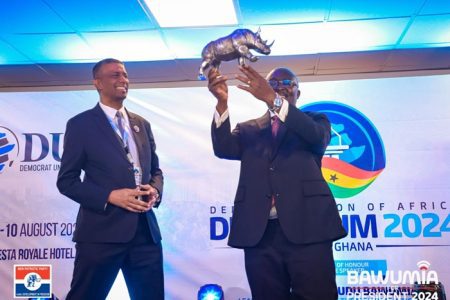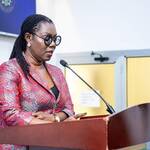Tony Peter Clement, a former Canadian Minister of Industry in charge of digitalization, science and technology, and President of the Treasury Board, Canada, has commended Ghana’s ambitious digitalization agenda, urging other developing nations to adopt similar initiatives.
He highlighted Ghana’s success in leveraging the digital revolution to enhance accountability and transparency across all sectors of its economy.
Speaking at the Democrat Union of Africa (DUA) Forum 2024 in Accra, Clement emphasized the transformative impact of Ghana’s digital strategies, particularly in areas like Mobile Money Interoperability and the biometric national identification system.
His address, titled “Leveraging AI as a Tool to Build Stronger Campaign Coalitions,” underscored the importance of these initiatives in driving Ghana’s economic growth.
Clement called on developing countries to bridge the digital divide between rural and urban areas and to strengthen cybersecurity measures to safeguard their digital advancements.
He also advocated for effective public-private partnerships as a crucial element in accelerating Ghana’s digital transformation.
A milestone in financial inclusion
One of the key achievements in Ghana’s digitalization efforts is the Mobile Money Interoperability system, launched in May 2018 by Vice-President Alhaji Dr. Mahamudu Bawumia through the Ghana Interbank Payment and Settlement Systems Limited (GhIPSS).
This system has significantly deepened financial inclusion and promoted cashless transactions across the country.
The Mobile Money Interoperability system simplifies the process of transferring funds between different mobile money networks, overcoming challenges such as difficulties in opening bank accounts, high maintenance costs relative to customers’ income levels, and financial literacy barriers.
The system enables seamless transactions across all networks, reducing the need for third-party payment providers and enhancing security and convenience for users.
Clement highlighted this system as a key example of how digitalization can drive economic growth and improve financial intermediation, benefiting businesses and individuals alike.
He noted that such innovations have not only integrated more citizens into the financial ecosystem but also created a more efficient and secure financial landscape in Ghana.
A call to action for developing nations
Clement’s endorsement of Ghana’s digitalization agenda serves as a call to action for other developing nations to embrace similar strategies.
He emphasized that by investing in digital infrastructure, bridging the digital divide, and fostering public-private partnerships, countries can achieve significant economic gains and improve governance.
The event was organized under the auspices of the Konrad Adenauer Stiftung and the New Patriotic Party (NPP).
The high-level forum, themed “Strengthening Democratic Institutions for Political Stability: Crafting Africa’s Response,” brought together participants from across Africa and beyond.
Vice-President Alhaji Dr. Bawumia emphasized the importance of conducting free, fair, and transparent elections across Africa as a crucial means of sustaining the continent’s peace and political stability.
In a keynote address, he highlighted Ghana’s democratic journey as a testament to the significance of nurturing strong democratic institutions.
“Ghana’s democratic journey is a testament to the importance of nurturing democratic institutions. Our electoral processes are characterized by transparency and credibility, with institutions like the Electoral Commission playing a pivotal role in ensuring free and fair elections.
“The peaceful transition of power between different political parties over the past three decades is a hallmark of our democracy, demonstrating our commitment to upholding the will of the people,” Dr Bawumia remarked.
Reflecting on the forum’s theme, Bawumia noted, “This year’s theme, ‘Strengthening Democratic Institutions for Political Stability: Crafting Africa’s Response,’ is both timely and critical. It underscores the pivotal role that robust democratic frameworks play in fostering political stability and socioeconomic progress.”
He further emphasized the need for stakeholders to draw inspiration from Ghana’s experiences and renew their commitment to strengthening democracies across the continent. “As we gather here today, let us draw inspiration from Ghana’s experiences and commit to strengthening democracies across the continent. Our collective efforts can transform Africa into a beacon of democracy, stability, and prosperity,” Bawumia added.
Bawumia also praised the achievements of President Nana Addo-Dankwa Akufo-Addo’s administration, particularly in education, healthcare, and digitalization.
He cited the introduction of free senior high school education and improvements in the National Health Insurance Scheme as significant milestones that have positively impacted the lives of Ghanaians.
In his concluding remarks, Bawumia extended his best wishes to all presidential aspirants contesting upcoming general elections in Africa, including himself, as Ghana prepares for its general elections in December.
The DUA Forum 2024 featured active participation from various political parties across Africa, including the Forum for Democratic Change (FDC) in Uganda, Inkatha Freedom Party in South Africa, Unity Party in Liberia, PDCI-RDA in Ivory Coast, Popular Democratic Movement in Namibia, and many others.
The forum provided a platform for these parties to discuss strategies for strengthening democratic institutions and ensuring political stability across the continent.
- Trump slaps tariffs: Ghana, UK-10%, EU-20%, others-50% - 2 April 2025
- BoG policy rate hike: MPC’s 3-2 vote and reasons - 2 April 2025
- Painter accused of stealing BoG cables granted GH₵1m bail - 2 April 2025

